Related Research Articles

In probability theory and statistics, the binomial distribution with parameters n and p is the discrete probability distribution of the number of successes in a sequence of n independent experiments, each asking a yes–no question, and each with its own Boolean-valued outcome: success or failure. A single success/failure experiment is also called a Bernoulli trial or Bernoulli experiment, and a sequence of outcomes is called a Bernoulli process; for a single trial, i.e., n = 1, the binomial distribution is a Bernoulli distribution. The binomial distribution is the basis for the popular binomial test of statistical significance.

A black hole is a region of spacetime where gravity is so strong that nothing — no particles or even electromagnetic radiation such as light — can escape from it. The theory of general relativity predicts that a sufficiently compact mass can deform spacetime to form a black hole. The boundary of no escape is called the event horizon. Although it has an enormous effect on the fate and circumstances of an object crossing it, according to general relativity it has no locally detectable features. In many ways, a black hole acts like an ideal black body, as it reflects no light. Moreover, quantum field theory in curved spacetime predicts that event horizons emit Hawking radiation, with the same spectrum as a black body of a temperature inversely proportional to its mass. This temperature is on the order of billionths of a kelvin for black holes of stellar mass, making it essentially impossible to observe directly.
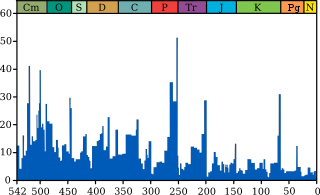
An extinction event is a widespread and rapid decrease in the biodiversity on Earth. Such an event is identified by a sharp change in the diversity and abundance of multicellular organisms. It occurs when the rate of extinction increases with respect to the rate of speciation. The number of major mass extinctions in the last 440 million years are estimated from as few as five to more than twenty. These differences stem from disagreement as to what constitutes an extinction event as "major", and the data chosen to measure past diversity.
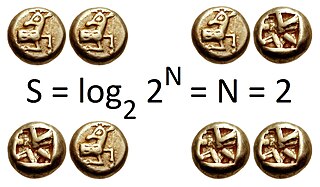
In information theory, the entropy of a random variable is the average level of "information", "surprise", or "uncertainty" inherent in the variable's possible outcomes. The concept of information entropy was introduced by Claude Shannon in his 1948 paper "A Mathematical Theory of Communication", and is also referred to as Shannon entropy. As an example, consider a biased coin with probability p of landing on heads and probability 1 − p of landing on tails. The maximum surprise is for p = 1/2, when there is no reason to expect one outcome over another. In this case a coin flip has an entropy of one bit. The minimum surprise is for p = 0 or p = 1, when the event is known and the entropy is zero bits. When the entropy is zero bits, this is sometimes referred to as unity, where there is no uncertainty at all - no freedom of choice - no information. Other values of p give different entropies between zero and one bits.

Ski jumping is a winter sport in which competitors aim to achieve the longest jump after descending from a specially designed ramp on their skis. Along with jump length, competitor's style and other factors affect the final score. Ski jumping was first contested in Norway in the late 19th century, and later spread through Europe and North America in the early 20th century. Along with cross-country skiing, it constitutes the traditional group of Nordic skiing disciplines.
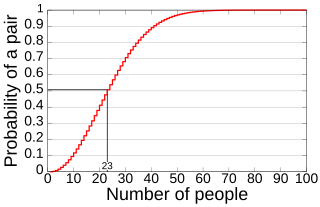
In probability theory, the birthday problem asks for the probability that, in a set of n randomly chosen people, at least two will share a birthday. The birthday paradox is that, counterintuitively, the probability of a shared birthday exceeds 50% in a group of only 23 people.
Ben Fouhy is a New Zealand flatwater and marathon canoeist who has been competing since the early 2000s. Competing in three Summer Olympics, he won the silver in the K-1 1000 m event at Athens in 2004, as well as finishing fourth in the 2008 Olympics and ninth in the 2012 Olympics in the same event. He is the recipient of the 2003 Halberg Award for NZ Sportsman of the Year and a former world record holder in the K1 1000m event.

Adam Joseph van Koeverden is a Canadian sprint kayaker and politician. He is an Olympic gold medallist in the K-1 500m category (2004) and a two-time world champion in K-1 500 (2007) and K-1 1000 (2011), winning four Olympic and eight world championship medals. His home club is the Burloak Canoe Club in Oakville, Ontario.

The surface gravity, g, of an astronomical object is the gravitational acceleration experienced at its surface at the equator, including the effects of rotation. The surface gravity may be thought of as the acceleration due to gravity experienced by a hypothetical test particle which is very close to the object's surface and which, in order not to disturb the system, has negligible mass. For objects where the surface is deep in the atmosphere and the radius not known, the surface gravity is given at the 1 bar pressure level in the atmosphere.
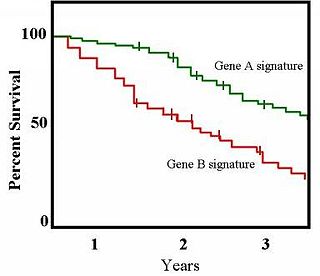
The Kaplan–Meier estimator, also known as the product limit estimator, is a non-parametric statistic used to estimate the survival function from lifetime data. In medical research, it is often used to measure the fraction of patients living for a certain amount of time after treatment. In other fields, Kaplan–Meier estimators may be used to measure the length of time people remain unemployed after a job loss, the time-to-failure of machine parts, or how long fleshy fruits remain on plants before they are removed by frugivores. The estimator is named after Edward L. Kaplan and Paul Meier, who each submitted similar manuscripts to the Journal of the American Statistical Association. The journal editor, John Tukey, convinced them to combine their work into one paper, which has been cited almost 61,000 times since its publication in 1958.
Steven Sean Ferguson is a sprint canoeist, surf lifesaver and former swimmer from New Zealand.
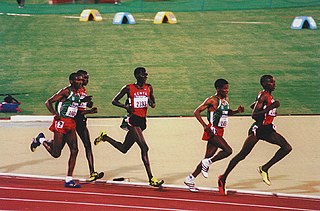
The 10,000 metres or the 10,000-metre run is a common long-distance track running event. The event is part of the athletics programme at the Olympic Games and the World Athletics Championships, and is common at championship level events. The race consists of 25 laps around an Olympic-sized track. It is less commonly held at track and field meetings, due to its duration. The 10,000-metre track race is usually distinguished from its road running counterpart, the 10K run, by its reference to the distance in metres rather than kilometres.

The 5000 metres or 5000-metre run is a common long-distance running event in track and field, approximately equivalent to 3 miles 188 yards or 16,404 feet 2 inches. It is one of the track events in the Olympic Games and the World Championships in Athletics, run over 12+1⁄2 laps of a standard track. The same distance in road running is called a 5K run; referring to the distance in metres rather than kilometres serves to disambiguate the two events. The 5000 m has been present on the Olympic programme since 1912 for men and since 1996 for women. Prior to 1996, women had competed in an Olympic 3000 metres race since 1984. The 5000 m has been held at each of the World Championships in Athletics in men's competition and since 1995 in women's.

Canoeing has been featured as competition sports in the Summer Olympic Games since the 1936 Games in Berlin, although they were demonstration sports at the 1924 Games in Paris. There are two disciplines of canoeing in Olympic competition: slalom and sprint.

The 2010 ICF Canoe Sprint World Championships were held 19–22 August 2010 in Poznań, Poland, on Lake Malta. This is the third time that the Polish city will host the championships, having done so previously in 1990 and 2001. Paracanoe and the women's C-1 200 m events that were exhibition events at the previous world championships in Dartmouth, Nova Scotia, Canada, became official events at these championships.
The Paleocene, or Palaeocene, is a geological epoch that lasted from about 66 to 56 million years ago (mya). It is the first epoch of the Paleogene Period in the modern Cenozoic Era. The name is a combination of the Ancient Greek παλαιός palaiós meaning "old" and the Eocene Epoch, translating to "the old part of the Eocene".

In probability theory and statistics, the Poisson distribution, named after French mathematician Siméon Denis Poisson, is a discrete probability distribution that expresses the probability of a given number of events occurring in a fixed interval of time or space if these events occur with a known constant mean rate and independently of the time since the last event. The Poisson distribution can also be used for the number of events in other specified intervals such as distance, area or volume.

The Mnet Asian Music Awards is a major music awards ceremony presented annually by entertainment company CJ E&M. First held in South Korea, the majority of prizes has been won by K-pop artists, although there are other Asian artistes winning in various award categories, such as for Best Asian Artist and other professional-related awards.

Max Hoff is a German sprint canoeist and former wildwater canoeist who has competed since the late 2000s. He has won a total of eight medals at the ICF Canoe Sprint World Championships with five golds and three silvers.

The Cretaceous–Paleogene (K–Pg) extinction event was a sudden mass extinction of three-quarters of the plant and animal species on Earth, approximately 66 million years ago. With the exception of some ectothermic species such as sea turtles and crocodilians, no tetrapods weighing more than 25 kilograms survived. It marked the end of the Cretaceous period, and with it the Mesozoic Era, while heralding the beginning of the Cenozoic Era, which continues to this day.